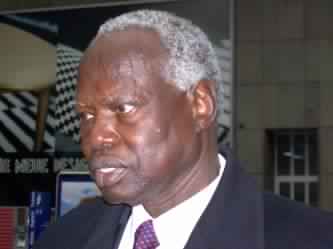
3rd Oct. 2009
Sayed Bona Malwal,
Dear brother,
Greetings,
Stemming from National brotherhood that makes us all concerned about each other’s deeds and from mutual respect and positive encounters that gathered us before, I write to you about your council to the NCP in its party convention, in the 1st of October 2009, which was to me in bad faith:
- You have condemned the National Reconciliation of 1977 and held it responsible for Nimeri’s betrayal of the 1972 Addis Ababa Agreement, this was declared by many before but not accepted from a man who has been close enough to know that the weakness of that agreement is that it was negotiated and signed with a fickle despot without any involvement of the National Political Forces and the despot failed to conceive the Agreement in terms of its National potential but broadcast it in terms of legitimizing his despotic Regime. The political forces, which engaged in the National Reconciliation, have indicated to that despotic Regime that the 1972 Agreement was the Regime’s only positive achievement. No wonder, it was their own baby. In his book “Southern Sudan from Conflict to Peace”, the late Prof. Mohammed Omar Bashir defended the legitimacy of the 1972 Agreement by saying that although it was bilateral, it was based upon the recommendations of the Round Table Conference of 1965, the Twelve Man Committee which followed the Conference and the 1967 All Party Conference. It is true that Sayed Mohamed Ahmed Mahjoub neglected the Round Table and Twelve Man Committee’s recommendations. This neglect was one of the points of disagreement within the Umma Party, which led later to a split in the party. Prof. Bashir documented how the second 1966 Umma-led Government appreciated the mentioned recommendations and convened the all party conference of 1967.
Nimeri dishonored the 1972 Agreement in three ways that are related to his Regime’s despotic nature and had nothing to do with the views of the National Front, which engaged with him at some point in National Reconciliation, and declared its failure publicly, as we did, as early as the 27th of October 1978. These three ways are:
First: He conceded some liberal rights for the South in the 1972 Agreements, namely, a degree of autonomy for the High Executive Council and the freedom to elect its President. The Regime could not tolerate such devolution of power. Therefore, Nimeri violated that autonomy. The council and the dictator crossed swards on several occasions, for example, over the election of its President, and over the location of the oil refinery, which he wanted to be in Kosti and the council wanted it to be in Bentu.
Second: In 1980 the dictator decided to divide the South into three Regions in contradiction of the 1972 Agreement. It is true he appeared to do so in response to the advise of General Joseph Lagu, but the whole exercise was conducted without due respect for the provisions of the 1972 Agreement.
Third: In 1983, the dictator decided arbitrarily to apply what he called Shariah in the whole of the Sudan, without Southern or National participation. He issued the infamous September Laws by Presidential decrees, contradicting the 1973 constitution.
The Umma Party opposed all three measures, and its leaders suffered the consequences of being arrested and imprisoned.
The weakness of the Addis Ababa Agreement was that it was negotiated and signed between two parties, with foreign mediation. The other partner was the Dictator. Dictatorship is about arbitrary decision making. That sealed the fate of the 1972 Agreement.
- You have been one of the well known critics of the 2005 Nivasha Agreement. The Umma Party, as you know was the Northerner source of several points which made the compromise inherent in the Agreement possible. However, the Umma Party was quite clear that although the Agreement was a welcome development to stop the war, it failed to address North/North and South /South conflicts. Therefore, without prejudice to Southern Rights, it should be developed to be a genuine Comprehensive Peace Agreement. You know very well that although the Agreement sought to create an inclusive Government in the Transition period, and to give priority to the cause of unity and to make it attractive, such commendable aims has been missed. The breach in confidence between the signatories to the agreement has grown to the point where they can only encounter each other in the presence of expatriate involvement. It is also well known that the Darfur and the Eastern Front Agreements are derailed. The broader Darfur Peace Process is at dead end. There are so many other National problems, which have reached the point of National Crisis. In such circumstances, it is incumbent upon the country’s political forces to move by all means to seek to contain the National crises to save the National Agenda of comprehensive peace, and genuine Democratization. National and International opinion about Sudan have come to the conclusion that a supreme effort must be made to save the country from collapse. Even the two signatories to the 2005 agreement have accepted the need for this effort. For this reason the National Congress Party signed the Agreement of National Accord in May 2008. Although the accord failed to takeoff, its aims are valid and necessary. The Juba Conference was an attempt by SPLM in search of National Consensus. For various reasons, the Juba endeavor was, so far, more successful than Khartoum’s. As an independent Participant in both efforts, the Umma Party is in a position to offer an informed Judgment.
A formalistic view of the CPA would make Southern Development dependant only upon a 50% share of Southern oil, would sharply segregate North and South in terms of a Partisan Religious/ Secular divide, both of which are a recipe for secession. Such a formulistic interpretation would make no room for the necessary accommodation of Darfurian aspirations. Pitting the terms of the Agreement against the requirements of Comprehensive Peace. No politically conscious national person would recommend such National suicide.
- About the Juba conference, you made two basic points of disinformation.
- That the conference threatens the peace Agreement. As you know, the Agreement is already in trouble with both parties expecting a breakdown and preparing for unilateral action. The Juba conference was about a National effort to avoid such contingencies.
And despite the NCP’s decision to boycott the conference, the conference did not eschew its National targets. The recommendations of the Juba conference are a personification of National purpose and moderation. Your party participated in the conference, and your representatives could testify that there was no Agenda imposed upon the participants. They were also assured that the ultimate recommendations will be reached by consensus. To withdraw in such circumstances can only be explained in terms of subjective partisan interest. Some Southern parties have criticized GoSS for failure to allow freedoms for their political competitors in the South. The recommendation to guarantee freedom applies to the whole country. If they needed further commitment by the SPLM to abide by this in the South, they could have inserted such a point. Instead, they simply withdrew and made false allegations.
- You alleged that the Conference threatens the holding of the National Elections. As may you know, the only party which has a particular stake in the National Elections, is the National Umma Party, because it was the major political force in the country when there were free and fair Elections, and because today it is the only party which is not represented at all levels of Governance. Others who are also not represented, have been participants but expelled. Therefore, no one can outbid us in keenness to hold the National Election. Some thought that the National Umma Party is in no shape for Elections because of some party difficulties. However, in all previous General Elections Umma had similar difficulties. The breakaway factions have consistently failed to challenge the party. The Umma Party and Ansar institutions are a classic case of the whole being greater than the sum of its parts. Umma Party and Ansar Organizations are the custodians to three National legacies: The legacy of History, the legacy of National struggle and the legacy of National So long as its leadership and grassroots remain faithful to these legacies and accommodate sociopolitical change, dissent is and will continue to be like fish out of water. It is true that there are some in both Government and Opposition who may not be prepared for National Elections. However, there is no truth about your allegation that the Juba recommendations issued an ultimatum: Either our views are accepted or we boycott the elections.
The Sudan, under one party rule has always suffered from rigged Elections. Elections which seek to prolong the control of the ruling party rather that to allow a peaceful succession in Government.
It is true now we have a National Electoral commission. We have welcomed this institution and cooperated keenly with it. Its conduct of what falls within its authority has been commendable. However, there are certain matters which are beyond its powers, namely:
- The guarantee of basic freedoms and the removal of the legal and institutional instruments of Totalitarianism.
- To guarantee the prevention of encroachments by the institutions of Government upon the electoral process.
- To guarantee that elections are general including Darfur.
- To provide for access by the parties to the National media.
As you know, these principles are necessary conditions for free and fair elections. To seek to guarantee them represents keenness on the elections. To avoid them is to hold non-elections. All political parties, worth the description, have an interest in these principles. Otherwise, they simply act as decour for on illegitimate process.
Finally, Whatever your previous fears about the Juba conference, it is incumbent upon all political activists who seek the National interest to sign the Juba conference recommendations. To throw mud at them, in the current National circumstances, is to endorse National catastrophe.
I am yours sincerely,
Al Sadig Al Mahdi
C.T. Chairman of NCP.
C.T. Chairman of SPLM
C.T. Secretariat of Juba Conference
Secretariat of Kenana Forum

